Entertainment
Michael Latt, who was fatally shot, leaves a legacy of uplifting marginalized artists
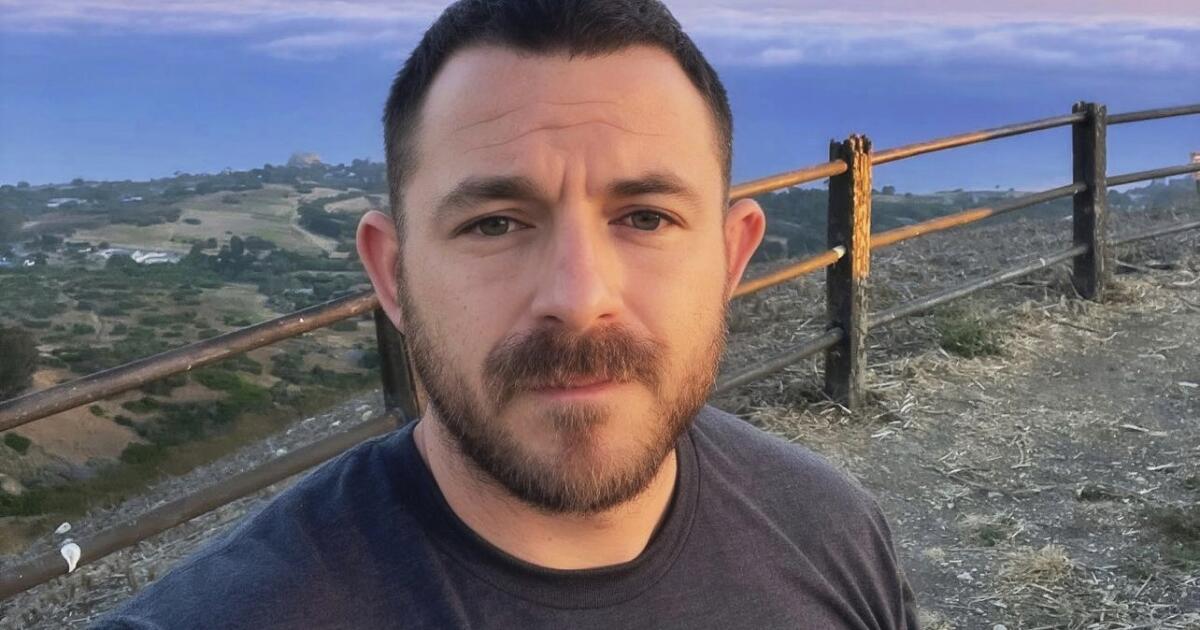
Michael Latt, a 33-year-old marketing strategist and social justice advocate who was shot and killed in his Los Angeles home Monday, leaves behind a legacy of uplifting marginalized artists — but he didn’t foresee this path for himself.
After graduating from Chapman University in 2013 with a degree in public relations and advertising, Latt kick-started his career in entertainment marketing, then, by chance, became the digital marketing director for Ryan Coogler’s acclaimed first feature, “Fruitvale Station.” The film’s release coincided with the George Zimmerman trial.
Zimmerman, a neighborhood watch coordinator, fatally shot unarmed teenager Trayvon Martin on Feb. 26, 2012, in his gated community in Sanford, Fla. He was acquitted the day after “Fruitvale Station” opened in limited release, and protests over the trial’s outcome magnified the film’s impact.
For Latt, promoting the film was a turning point.
“Working on Ryan Coogler’s ‘Fruitvale Station’ opened my eyes up to how prevalent and insidious white supremacy is in our country and also showed me the potent power of storytelling to change hearts and minds,” Latt said in a 2019 interview with Forbes.
A year after “Fruitvale Station” debuted, in the wake of the Ferguson unrest, Coogler asked Latt to lead marketing for the artist-activist collective Blackout for Human Rights, and there he began to more clearly envision a future in social activism.
“The moment I realized that I could use my skill set for social good, I decided to dedicate the rest of my career to helping others, empowering storytellers of color and fighting injustice wherever it stands,” he told Forbes.
“Fruitvale” producer Sev Ohanian, who founded production company Proximity Media with Ryan and Zinzi Coogler, first began working with Latt when “Fruitvale Station” was selected for the 2013 Sundance Film Festival. Ohanian said Latt was pivotal in marketing the film online, starting with a “humble Instagram page.”
“To this day we attribute much of that little film’s ability to find an audience to the work Michael did in single-handedly getting the word out online,” he told The Times in an email. “I’ve always felt that Mike was a trailblazer in utilizing social media with the model he established with ‘Fruitvale Station.’ It’s not at all surprising to see all these years later what an amazing legacy he established for himself as an advocate of the arts, and issues dear to him.”
This became the mission of Latt’s entertainment marketing consulting firm Lead With Love, which he founded in 2019. Through Lead With Love, Latt strove to diversify the pool of creatives in Hollywood.
Since its inception four years ago, Lead With Love has driven digital attention toward myriad festivals, campaigns and social justice organizations focused on uplifting women and artists of color, and their work.
In 2022, Lead With Love partnered with “Manchester by the Sea” producer Kimberly Steward’s K Period Media Foundation (KPMF) on a campaign to promote Chinonye Chukwu’s “Till.” The film tells the story of Mamie Till-Mobley and her pursuit of justice for her 14-year-old son, Emmett Till, who was tortured and lynched in Mississippi in 1955 for allegedly whistling at a white woman — whose testimony at the subsequent murder trial was disputed.
Lead With Love’s three-pronged campaign included an exhibition featuring Black photographers that was on view for about a month at two Black-owned galleries in South L.A. and Atlanta; a 150-foot mural at the Black-owned L.A. event space the Beehive that was dedicated to Emmett and Mamie Till; and a series of events focused on empowering Black women.
At one such event, “Love in Action: Honoring Mothers,” held on Oct. 11, 2022, Black women and mothers were gathered for a screening of “Till.” Afterward, they were invited to assemble their own flower bouquets to pose for portraits. KPMF’s Elizabeth Mosely still remembers being stunned by the thoughtfulness of the flower-making session, which Latt orchestrated himself.
“After going through the traumatic experience of watching that film, then you have this healing process of making these flowers together,” Mosely said. “That was important to him. He was like, ‘We need something that’s uplifting after this really heavy movie.’ I personally had never seen that before, and that was beautiful.”
During several early brainstorming sessions, Mosely had told Latt that she wasn’t sure whether his “big ideas,” as she called them, were feasible — but he always found a way.
As to whether Lead With Love has a future beyond Latt, Mosely remains unsure.
“From my perspective, Lead With Love was Michael,” she said. “I hope somebody can continue the work in a way that he would’ve wanted, but his company was so synonymous with him, and the clients he had were because of his relationships and who he was.”
“Michael had a beautiful way of connecting culture and community,” KPMF founder Steward said in a statement to The Times. “There was always a heartbeat behind his work and genuineness in his efforts. His kindness, tenacity and generosity to this world will not be forgotten.”
In addition to promoting individual films, Lead With Love has also advised the Sundance Institute, where Latt’s mother, Michelle Satter, serves as the founding director of its feature film program. For her work at the institute, Satter will receive the the Jean Hersholt Humanitarian Award (and an Oscar statuette) at the film academy’s Governors Awards in January.
Building on his mother’s work, Latt had helped increase visibility over the years for Sundance.
For the 2016 fest, Latt partnered with Facebook to produce an original video series featuring several creatives Latt had worked with before, including Nate Parker and Common, and others attending the event, including Christopher Nolan and Diego Luna.
According to Lead With Love’s website, the 10-plus videos published during the festival generated more than 10 million views and 50 million impressions — a 400% increase in impressions compared with the previous year.
“He dedicated his career to serving others, employing storytelling, art and various mediums to create enduring change, and galvanizing communities with hope, love and inspiration,” the Sundance Institute said in a statement on behalf of the Latt family. “Michael will never be forgotten and his legacy and work will carry on through his family, his friends and his colleagues.”
Police say Latt’s killing was the culmination of a series of threats made by Jameelah Michl, who was an extra on A.V. Rockwell’s film “A Thousand and One” and began stalking Rockwell shortly thereafter. In June, the director filed a restraining order against Michl, whose initially innocuous fan messages had turned violent and threatening, Rockwell said in court documents reviewed by The Times.
Five months later, Michl forced her way into Latt’s Mid-City apartment building and shot him, authorities say.
According to a news release from the district attorney’s office, Michl targeted Latt because he was “friends with a woman [Michl] had been stalking,” but Los Angeles County Dist. Atty. George Gascón didn’t name Rockwell as the stalking victim.
“Our hearts ache for the loss of a passionate advocate who believed in the principles of justice and equity within our criminal legal system,” Gascón said in a statement Thursday. “It is devastating to see a life cut short, especially one dedicated to fighting for a more just society.”
Satter; Latt’s father, writer-producer David Latt; and Latt’s older brother, Franklin Latt, co-head of the motion picture talent department at Creative Artists Agency; issued their own remarks Thursday.
“He devoted his career to supporting others, championing organizations that raised up women and artists of color, along with leveraging storytelling, art and various mediums to create enduring change and instill communities with hope, love and inspiration,” his parents said in a statement. “Michael will never be forgotten and we ask you to all carry on his legacy of love, compassion and fierce dedication to positive and lasting change.”
His brother added: “To know Michael was to understand that he lived his life with intention. The outpouring of love and support from all those he touched has been gratifying for our family beyond words. He founded his company Lead With Love to champion artists and to affect positive change for the world at large. His legacy will live on eternally through all of us as we choose to lead our own lives with that very same intention.”
On Thursday night, filmmaker Ava DuVernay dedicated the New York City premiere of her film “Origin” to Latt. Latt worked as a communications consultant for DuVernay’s independent distribution company ARRAY Now from 2019 to 2020.
“[Latt] was such a good guy, an extraordinary person — one of those people that comes into the room and just lights it up,” DuVernay said, holding back tears. “If you needed him, he would be there. He didn’t ask for money, he didn’t ask for fame, he didn’t ask for anything. He liked to work behind the scenes to get the word out about the things that mattered.”

Movie Reviews
Reagan Is Almost Fun-Bad But It’s Mostly Just Bad-Bad
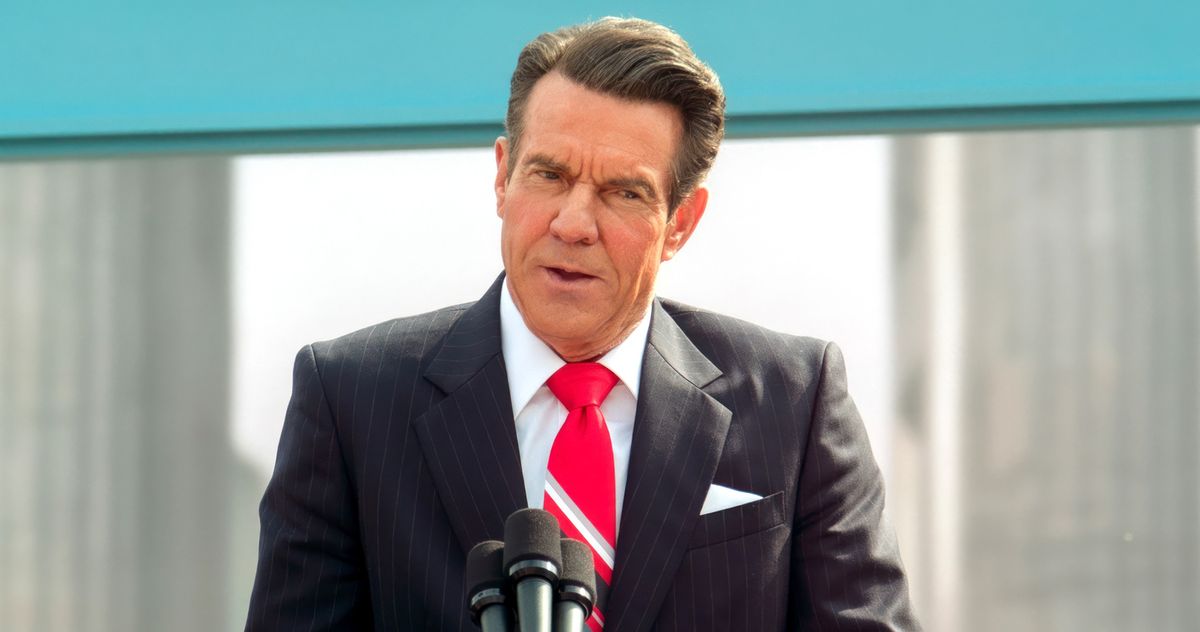
Dennis Quaid in Reagan.
Photo: Showbiz Direct/Everett Collection
Reagan is pure hagiography, but it’s not even one of those convincing hagiographies that pummel you into submission with compelling scenes that reinforce their subject’s greatness. Sean McNamara’s film has slick surfaces, but it’s so shallow and one-note that it actually does Ronald Reagan a disservice. The picture attempts to take in the full arc of the President’s life, following him from childhood right through to his 1994 announcement at the age of 83 that he’d been diagnosed with Alzheimer’s Disease. But you’d never guess that this man was at all complex, complicated, conflicted — in other words, human. He might as well be one of those animatronic robots at Disney World, mouthing lines from his famous speeches.
Dennis Quaid, a very good actor who can usually work hints of sadness into his manic machismo, is hamstrung here by the need to impersonate. He gets the voice down well (and he certainly says “Well” a lot) and he tries to do what he can with Reagan’s occasional political or career setbacks, but gone is that unpredictable glint in the actor’s eye. This Reagan doesn’t seem to have much of an interior life. Everything he thinks or feels, he says — which is maybe an admirable trait in a politician, but makes for boring art.
The film’s arc is wide and its focus is narrow. Reagan is mainly about its subject’s lifelong opposition to Communism, carrying him through his battles against labor organizers as president of the Screen Actors Guild and eventually to higher public office. The movie is narrated by a retired Soviet intelligence official (Jon Voight) in the present day, answering a younger counterpart’s questions about how the Russian empire was destroyed. He calls Reagan “the Crusader” and the moniker is meant to be both combative and respectful: He admires Reagan’s single-minded dedication to fighting the Soviets. They, after all, were single-minded in their dedication to fighting the U.S., and the agent has a ton of folders and films proving that the KGB had been watching Reagan for a long, long time.
By the way, you did read that correctly. Jon Voight plays a KGB officer in this picture, complete with a super-thick Russian accent. There’s a lot of dress-up going on — it’s like Basquiat for Republicans, even though the cast is certainly not all Republicans — and there’s some campy fun to be had here. Much has been made of Creed’s Scott Stapp doing a very flamboyant Frank Sinatra, though I regret to announce that he’s only onscreen for a few seconds. Robert Davi gets more screentime as Leonid Brezhnev, as does Kevin Dillon as Jack Warner. Xander Berkeley puts in fine work as George Schultz, and a game Mena Suvari shows up as an intriguingly pissy Jane Wyman, Reagan’s first wife. As Margaret Thatcher, Lesley-Anne Down gets to utter an orgasmic “Well done, cowboy!” when she sees Reagan’s “Mr. Gorbachev, tear down this wall” speech on TV. And my ’80s-kid brain is still processing C. Thomas Howell being cast as Caspar Weinberger.
To be fair, a lot of historians give Reagan credit for helping bring about both the Gorbachev revolution and the eventual downfall of the U.S.S.R. and its satellites, so the film’s focus is not in and of itself a misguided one. There are stories to be told within that scope — interesting ones, controversial ones, the kind that could get audiences talking and arguing, and even ones that could help breathe life into the moribund state of conservative filmmaking. But without any lifelike characters, it’s hard to find oneself caring, and thus, Reagan’s dedication to such narrow themes proves limiting. We get little mention of his family life (aside from his non-stop devotion to Nancy, played by Penelope Ann Miller, and vice versa). Other issues of the day are breezed through with a couple of quick montages. All of this could have given some texture to the story and lent dimensionality to such an enormously consequential figure. But then again, if the only character flaw you could find in Ronald Reagan was that he was too honest, then maybe you weren’t very serious about depicting him as a human being to begin with.
See All
Entertainment
How Toto held the line
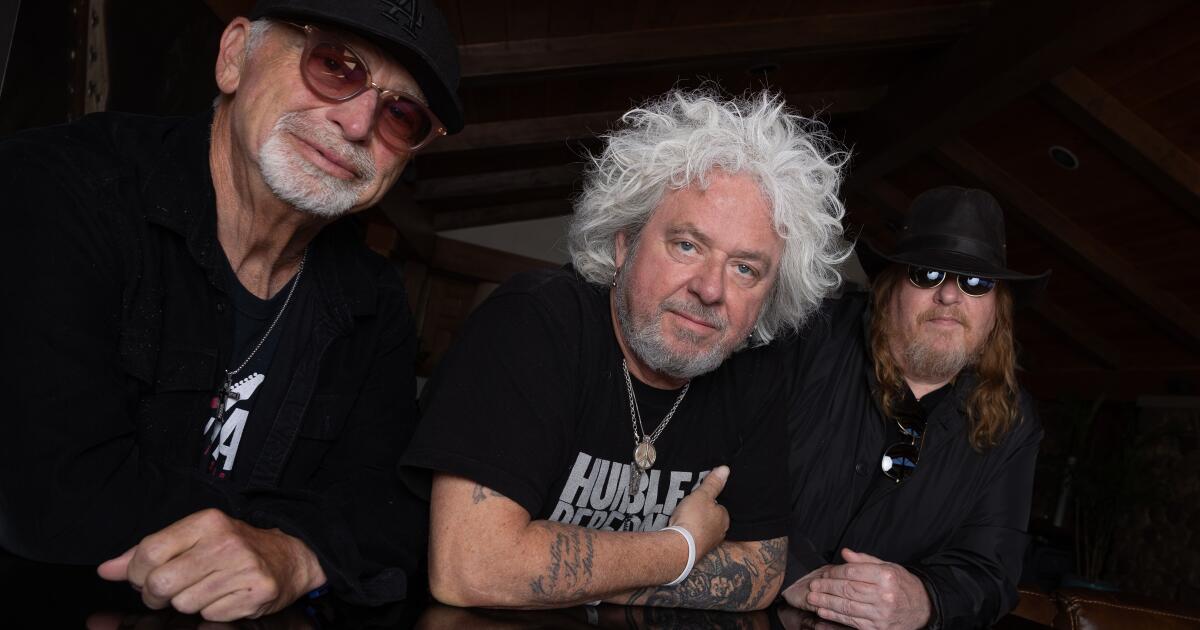
Steve Lukather has lived in his house overlooking Studio City since 1979 — longer than you’d expect, perhaps, given that he bought the place before his band Toto exploded with its fourth album, 1982’s quadruple-platinum “Toto IV,” which won Grammy Awards for album and record of the year and spawned a chart-topping single in the yearning, sumptuous, still-inescapable “Africa.”
“I don’t live a big, huge, stupid life,” Lukather says, brushing away any surprise that he didn’t upgrade as soon as he had the chance. “I like my little crib in the hills.” With a laugh, he adds, “I got it before both divorces, and I got to keep it.”
Lukather is hanging at home on a recent afternoon, barefoot as he sips a nonalcoholic Corona, with his bandmates David Paich and Joseph Williams. The walls are lined with plaques commemorating the millions of records sold by Toto and by some of the countless acts with whom Lukather has played in the studio; books about the Beatles and about rock’s greatest album covers are piled neatly on the fireplace.
In the middle of the modest living room sits a gleaming Steinway grand piano — the very one, Lukather points out, on which he wrote two of Toto’s biggest ballads, “I Won’t Hold You Back” and “I’ll Be Over You,” as well as “Turn Your Love Around,” which George Benson took to No. 1 on Billboard’s R&B chart in 1982.
Yet Lukather isn’t living in the past. On Sunday night, nearly four decades after the band last grazed the Hot 100, Toto will headline the Hollywood Bowl for the first time. The hometown show is part of a broader resurgence for a group of guys in their 60s and 70s who currently boast 30 million monthly listeners on Spotify — more than the Rolling Stones, Bruce Springsteen or Eric Clapton — and who’ve survived long enough to see their once-derided yacht-rock vibe come back into vogue.
What’s more, Toto is on the road with two founding members in guitarist Lukather and keyboardist Paich at a moment when some classic rock bands are lucky to claim a single OG. (Take a bow, Foreigner.)
How to explain Toto’s endurance? For sure, the band has been lifted by a rising tide for all legacy acts: a kind of catch-’em-while-you-can mind-set that’s helped draw huge audiences to the likes of Billy Joel, the Eagles, Stevie Nicks and Dead & Company. In 2022, Toto opened for Journey on a U.S. arena tour; this summer, Journey is playing stadiums with Def Leppard.
There’s also the songs, of course — “a couple of which have just struck a nerve with people,” says Williams, who joined Toto as lead singer in 1986. He means “Hold the Line,” the band’s hard-riffing breakthrough, and the swank “Rosanna,” which beat Willie Nelson’s “Always on My Mind” and the theme from “Chariots of Fire” for record of the year at the Grammys. But what he really means is “Africa,” that fever dream about a rain-blessing excursion that’s been memed to high heaven, been used on “South Park” and “Stranger Things” and been covered by Weezer as a joke that no one can quite figure out. On Spotify, the song has racked up nearly 2 billion streams.
According to Williams, these hits have “lived past the knowledge of the band itself,” as he puts it.
“I was on an elevator once in a hotel when we were on the road, and there were two couples in there,” he says. “One woman was saying to the other woman, ‘What are you guys doing tonight?’ and she says, ‘We’re going to see that band Africa.’”
“Imagine their disappointment when we walked out,” Lukather says.
As individuals, though, the members of Toto — among the other founders were the brothers Jeff and Steve Porcaro on drums and keys, respectively — have inspired a certain fascination, at least among music nerds, with the way they balanced the band with busy side careers as studio players who shaped the slick but soulful sound of ’80s pop.
Michael McDonald’s “I Keep Forgettin’,” Don Henley’s “The Boys of Summer,” Michael Jackson’s uber-blockbuster “Thriller” LP — all featured Lukather, Paich and/or the Porcaros. Also: Olivia Newton-John’s “Physical,” a framed platinum copy of which hangs next to one of Jackson’s “Beat It” by Lukather’s dining room table.
“These guys in their sleep could do it pretty much on the first take,” says David Foster, the veteran record producer who started out as a fellow session musician — you can hear both him and Paich behind Benson on “Turn Your Love Around” — before becoming the one hiring Toto’s members to play on hit records like Chicago’s “Hard to Say I’m Sorry.”
“It was just an amazing array of musicians,” he adds. “David Paich has the best feel of any piano player I’ve ever met.”
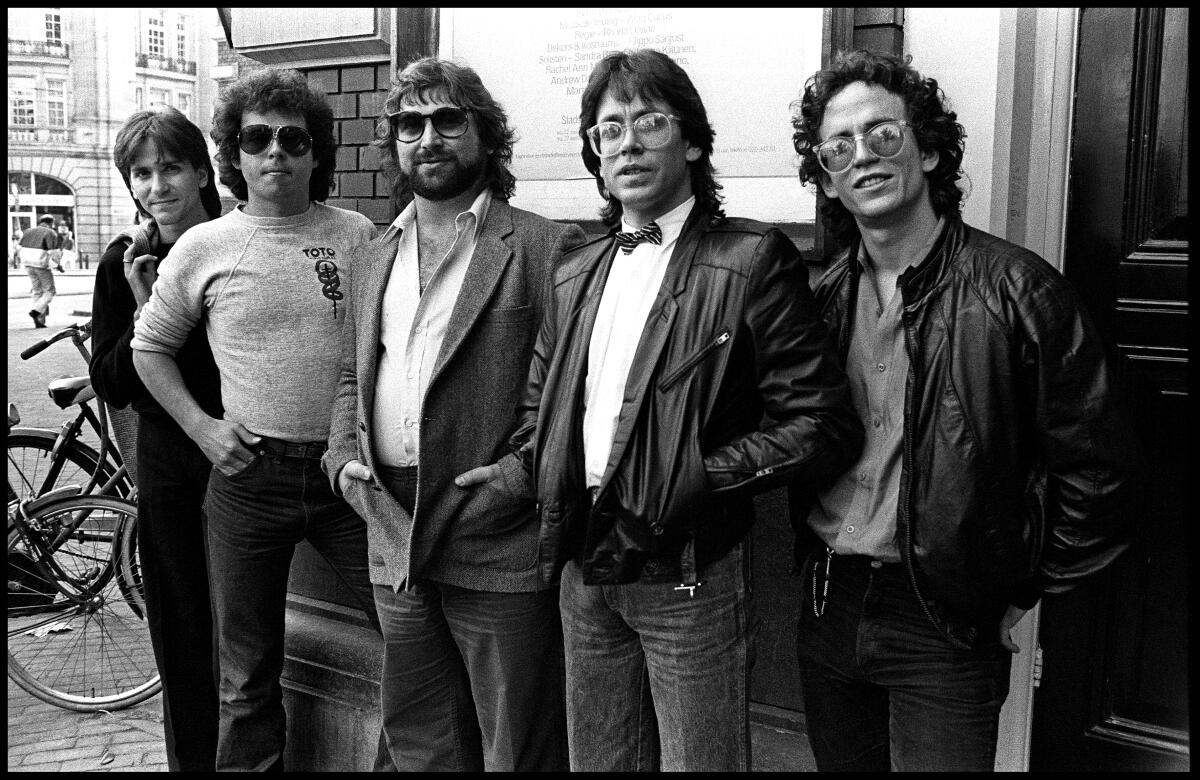
Toto in Amsterdam in 1982: Mike Porcaro, from left, Steve Lukather, David Paich, Jeff Porcaro and Steve Porcaro.
(Rob Verhorst / Redferns / Getty Images)
Toto’s high-gloss only-in-L.A. aesthetic didn’t age well into the ’90s and early 2000s, when rock went grungy then garage-y; even in Toto’s heyday, critics dismissed the band as hot-dogging technicians. (Rolling Stone’s oft-quoted dismissal: “All chops and no brains.”)
Yet a new generation of acts — Haim, Bon Iver, the War on Drugs, Mk.gee — has lovingly embraced the intricate sense of craft that Toto built into its records. And though the members’ session work wasn’t highly visible in the early, no-liner-notes era of digital music, their contributions are now eagerly tracked on websites like Discogs and in music docs like this year’s “The Greatest Night in Pop,” about the recording of “We Are the World” — one more defining mid-’80s smash that featured Paich and Steve Porcaro on keyboards.
“Everybody knows Toto, but you only really know Toto when you know all the other things they worked on and how sick they were in any circumstance,” says Ethan Gruska, a young L.A. musician and producer who’s convened a not-dissimilar crew of musicians to make not-dissimilarly tasty records with Phoebe Bridgers and Ryan Beatty. “Obviously, I’m biased” — Gruska is Williams’ nephew — “but my friends who are players have always thought that what they established was cool.”
Which isn’t to say that Lukather, Toto’s intellectual thought leader, is without his share of older-rock-star grievances. Among them:
- the term “yacht rock” (“We deserve a yacht, don’t you think?” he asks)
- the fact that Toto hasn’t been inducted into the Rock & Roll Hall of Fame (“It’s not based on stats — it’s based on the taste of 80-year-old men”)
- clueless record execs (“Walter Yetnikoff knew nothing about music,” he says of the late CBS Records boss)
- Weezer frontman Rivers Cuomo’s unwillingness to meet Toto after its hit “Africa” cover (“The guy just iced me”)
Still, asked whether he identifies a bitterness within himself, Lukather scoffs.
“F— no,” he says. “How could I be bitter with a career that’s almost 50 years old?”
Toto formed out of friendships struck up at Grant High School in the Valley. Nobody called anybody “nepo babies” back then, but the members of Toto were all connected: Paich’s father was Marty Paich, the arranger and conductor known for his work with Ray Charles and Barbra Streisand, among many others; the Porcaro brothers were the sons of the jazz drummer Joe Porcaro; Lukather’s dad worked in TV production on shows like “I Dream of Jeannie.” (No wonder that when they needed a new singer after frontman Bobby Kimball left the band, they clicked with Williams, son of the celebrated film composer John Williams.)
The players had already proved themselves as session guys — Boz Scaggs’ “Silk Degrees” was a crucial showcase — when they cut Toto’s self-titled debut in 1978 and scored a top 10 hit with “Hold the Line.” For the next year’s “Hydra,” “we started to go all Dungeons & Dragons on everybody,” Lukather says; the result whiffed, as did 1981’s “Turn Back.” But with “Toto IV” the band found just the right blend of groove, melody and texture, a sweet spot it stayed in for a few glorious years.
Did Toto’s famous perfectionism in the studio ever suck the joy out of making music?
“Sometimes,” Williams says, shaking his head beneath a black cowboy hat. “I spent a few times behind the glass where the joy had left my body.”
Lukather, for one, still loves getting deep into the weeds of recording; last year he released an album of new songs under his own name even though he knew he wouldn’t make any money from it. The paying work — not to mention the validation he’s grown accustomed to receiving from an audience — is onstage, which is one reason he went into something of a tailspin during the pandemic when live music ground to a halt.
The guitarist doesn’t want to go into detail about it today. But as he told the music-industry analyst Bob Lefsetz last year in an episode of Lefsetz’s podcast, Lukather struggled with depression and a subsequent bout with ketamine abuse. So when Toto finally got back on the road with Journey two years ago, he says, “it made me appreciate life like I’ve never appreciated it before.”
The tour reenergized Toto’s live business as well. “People saw us and went, ‘Wow, these guys are actually good,’” Lukather says.

Surely, the members of Toto saw the recent news that Journey’s Jonathan Cain had filed a lawsuit accusing the band’s Neal Schon of misusing the band’s corporate credit card — while the two are in the midst of playing concerts together? Williams laughs. “They need the money from the shows to keep suing each other,” he says.
“We’ve gotten close to that,” Lukather adds. “It’s not pleasant.” (Fun classic-rock fact: Lukather’s son is married to Cain’s daughter.)
Lukather doesn’t name names in regards to this almost-litigation. But asked why his solo record wasn’t a Toto album — Paich and Williams are both all over it — he says, “Don’t want to deal with fighting people over semantics.” Susan Porcaro Goings, widow of the late Jeff Porcaro (who died in 1992), has sued the band over her share of Toto’s royalties; Steve Porcaro quit Toto in 2019. Why did Steve Porcaro leave?
“The last tour he was on, he was so miserable every day,” Lukather says. Reached on the phone, Porcaro says, “I don’t know what he’s talking about. I was very, very happy on the road. I just needed a break.”
Last month, Porcaro announced that he’d sold the rights to his music — including the Toto songs he had a hand in as well as the indelible Michael Jackson hit “Human Nature,” which he co-wrote with lyricist John Bettis — in a deal with the Jackson estate and the music company Primary Wave. (The New York Times reported that the deal, the latest in a long series of catalog transactions involving veteran pop and rock artists, was “estimated in the low eight figures.”)
“OK, so 10, 11, 12 million?” Lukather asks. “I don’t know, I haven’t talked to him about it. But most of the people I know that have sold have regretted it.” He’s been approached, he adds, and said no every time. Lukather’s view is that it’s smarter to resist a one-time payout — “Living in California, they take 50%, boom, right off the bat” — and instead keep the royalty checks coming “a couple times a year,” he says.
“Also, you have no say [after selling your rights] if somebody wants to make a toilet-paper commercial out of one of your songs,” he adds. “That’s my life and my creativity balled into this thing called music. It’s personal.”
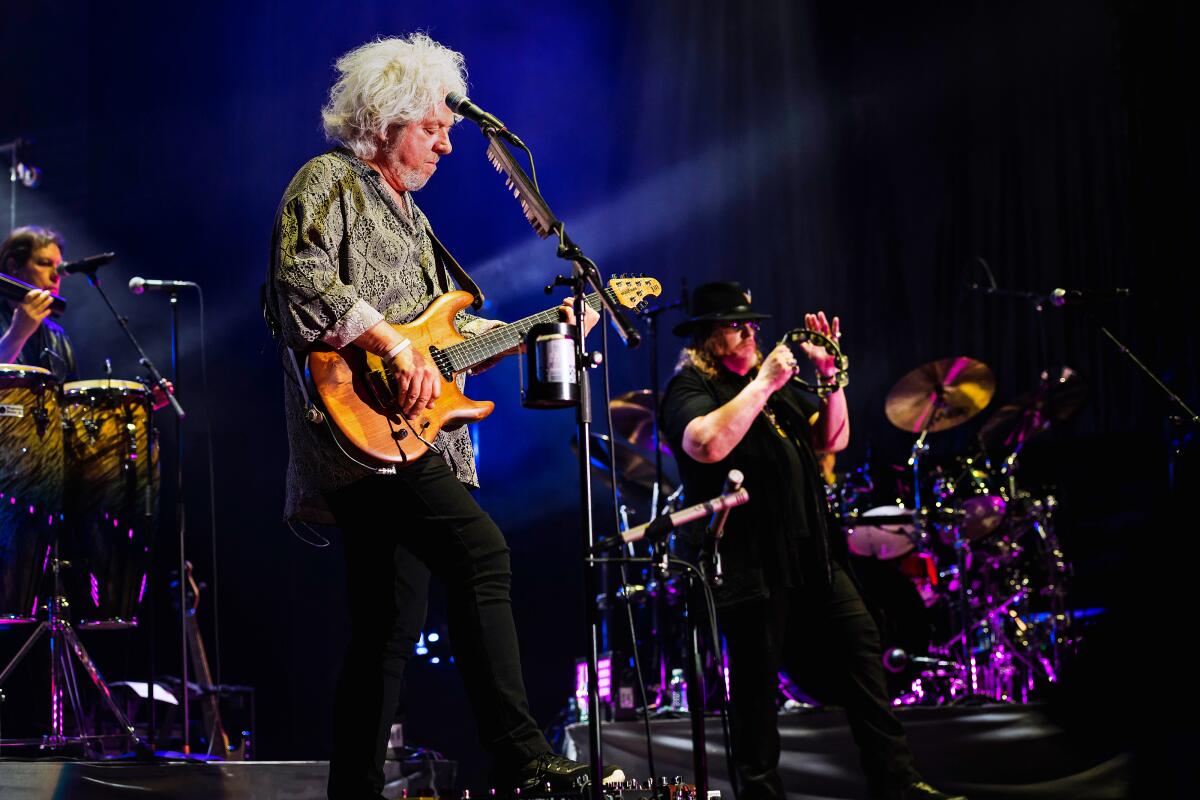
Steve Lukather and Joseph Williams of Toto perform in Madrid in July.
(Mariano Regidor / Redferns / Getty Images)
For these reasons and others, Lukather serves as Toto’s manager, which he reckons keeps him busy on the phone and the computer for at least four hours every morning before whatever musical labor the day holds. Like the catalog buyers, would-be managers have tried to woo Toto.
“There’s been a lot of fabulous people — put ‘fabulous’ in quotes — and they all have 20 acts yet still find time to play golf every day,” he says. They’ll promise they can work untold wonders for the band, he adds. “It’s like dating — you’ll say anything you can think of to get those pants off.”
Which, considering the strong shape Toto is in, just makes Lukather laugh. “If we were sucking the last bit of air out of the tire, it’d be a different conversation,” he says. “But we’re headlining a stadium show in Amsterdam in February. We’re doing 80,000 people at a festival in Mexico City with Paul McCartney and Green Day, and our name’s right there. It’s astounding to me, man.
“This is getting bigger, not smaller. I’ll take the ride for a while.”
Movie Reviews
‘Don’t Let’s Go to the Dogs Tonight’ Review: An Extraordinary Adaptation Takes a Child’s-Eye View of an African Civil War

Alexandra Fuller‘s bestselling 2001 memoir of growing up in Africa is so cinematic, full of personal drama and political upheaval against a vivid landscape, that it’s a wonder it hasn’t been turned into a film before. But it was worth waiting for Embeth Davidtz’s eloquent adaptation, which depicts a child’s-eye view of the civil war that created the country of Zimbabwe, formerly Rhodesia — a change the girl’s white colonial parents fiercely resisted.
Davidtz, known as an actress (Schindler’s List, among many others), directs and wrote the screenplay for Don’t Let’s Go to the Dogs Tonight and stars as Fuller’s sad, alcoholic mother. Or, actually, co-stars, because the entire movie rests on the tiny shoulders and remarkably lifelike performance of Lexi Venter — just 7 when the picture, her first, was shot. It is a bold risk to put so much weight on a child’s work, but like so many of Davidtz’s choices here, it also turns out to be shrewd.
Don’t Let’s Go to the Dogs Tonight
The Bottom Line Near perfection.
Venue: Telluride Film Festival
Cast: Lexi Venter, Embeth Davidtz, Zikhona Bali, Fumani N Shilubana, Rob Van Vuuren, Anina Hope Reed
Director-screenwriter: Embeth Davidtz
1 hour 38 minutes
Another those smart calls is to focus intensely on one period of Fuller’s childhood. Don’t Let’s Go to the Dogs Tonight is set in 1980, just before and during the election that would bring the country’s Black majority to power. Bobo, as Fuller was called, is a raggedy kid with a perpetually dirty face and uncombed hair, who’s seen at times riding a motorbike or sneaking cigarettes. She runs around the family farm, whose run-down look and dusty ground tell of a hardscrabble existence. The film was shot in South Africa, and Willie Nel’s cinematography, with glaring bright light, suggests the scorching feel of the sun.
Much of the story is told in Bobo’s voiceover, in Venter’s completely natural delivery, and in another daring and effective choice, all of it is told from her point of view. Davidtz’s screenplay deftly lets us hear and see the racism that surrounds the child, and the ideas that she has innocently taken in from her parents. And we recognize the emotional cost of the war, even when Bobo doesn’t. She often mentions terrorists, saying she is afraid to go into the bathroom alone at night in case there’s one waiting for her “with a knife or a gun or a spear.” She keeps an eye out for them while riding into town in the family car with an armed convoy. “Africans turned into terrorists and that’s how the war started,” she explains, parroting what she has heard.
At one point, the convoy glides past an affluent white neighborhood. That glimpse helps Davidtz situate the Fullers, putting their assumptions of privilege into context. Bobo has absorbed those notions without quite losing her innocence. Referring to the family’s servants, her voiceover says that Sarah (Zikhona Bali) and Jacob (Fumani N. Shilubana) live on the farm, and that “Africans don’t have last names.” Bobo adores Sarah and the stories she tells from her own culture, but Bobo also feels that she can boss Sarah around.
Venter is astonishing throughout. In close-up, she looks wide-eyed and aghast when visiting her grandfather, who has apparently had a stroke. At another point, she says of her mother, “Mum says she’d trade all of us for a horse and her dogs.” When she says, after the briefest pause, “But I know that’s not true,” her tone is not one of defiant disbelief or childlike belief, as might have been expected. It’s more nuanced, with a hint of sadness that suggests a realization just beyond her young grasp. Davidtz surely had a lot to do with that, and her editor, Nicholas Contaras, has cut all Bobo’s scenes into a sharply perfect length. Nonetheless, Venter’s work here brings to mind Anna Paquin, who won an Oscar as a child for her thoroughly believable role as a girl also who sees more than she knows in The Piano.
The largely South African cast displays the same naturalism as Venter, creating a consistent tone. Rob Van Vuuren plays Bobo’s father, who is at times away fighting, and Anina Hope Reed is her older sister. Bali and Shilubana are especially impressive as Sarah and Jacob, their portrayals suggesting a resistance to white rule that the characters can’t always speak out loud.
Davidtz has a showier role as Nicola Fuller. (The movie doesn’t explain its title, which hails from the early 20th century writer A.P Herbert’s line, “Don’t let’s go the dogs tonight, for mother will be there.”) Once, Nicola shoots a snake in the kitchen and calmly wanders off, ordering Jacob to bring her tea. More often, Bobo watches her mother drift around the house or sit on the porch in an alcoholic fog. But when her voiceover tells us about the little sister who drowned, we fathom the grief behind Nicola’s depression. And wrong-headed though she is, we understand her fury and distress when the election results make her feel that she is about to lose the country she thinks of as home. Davidtz gives herself a scene at a neighborhood dance that goes on a bit too long, but it’s the rare sequence that does.
There is more of Fuller’s memoir that might be a source for other adaptations. It is hard to imagine any would be more beautifully realized than this.
-

 Connecticut1 week ago
Connecticut1 week agoOxford church provides sanctuary during Sunday's damaging storm
-

 Technology1 week ago
Technology1 week agoBreakthrough robo-glove gives you superhuman grip
-
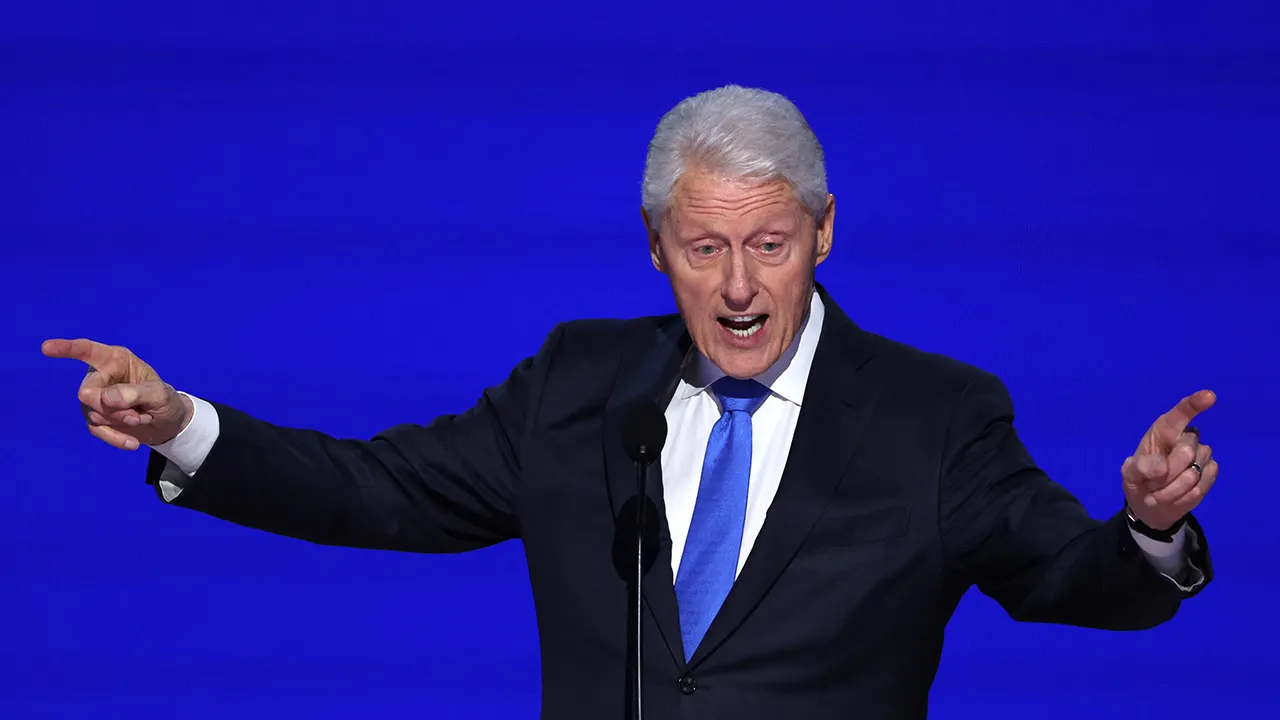
 Politics1 week ago
Politics1 week agoClinton lauds Biden as modern-day George Washington and president who 'healed our sick' in DNC speech
-

 Politics1 week ago
Politics1 week ago2024 showdown: What happens next in the Kamala Harris-Donald Trump face-off
-

 News1 week ago
News1 week agoWho Are Kamala Harris’s 1.5 Million New Donors?
-
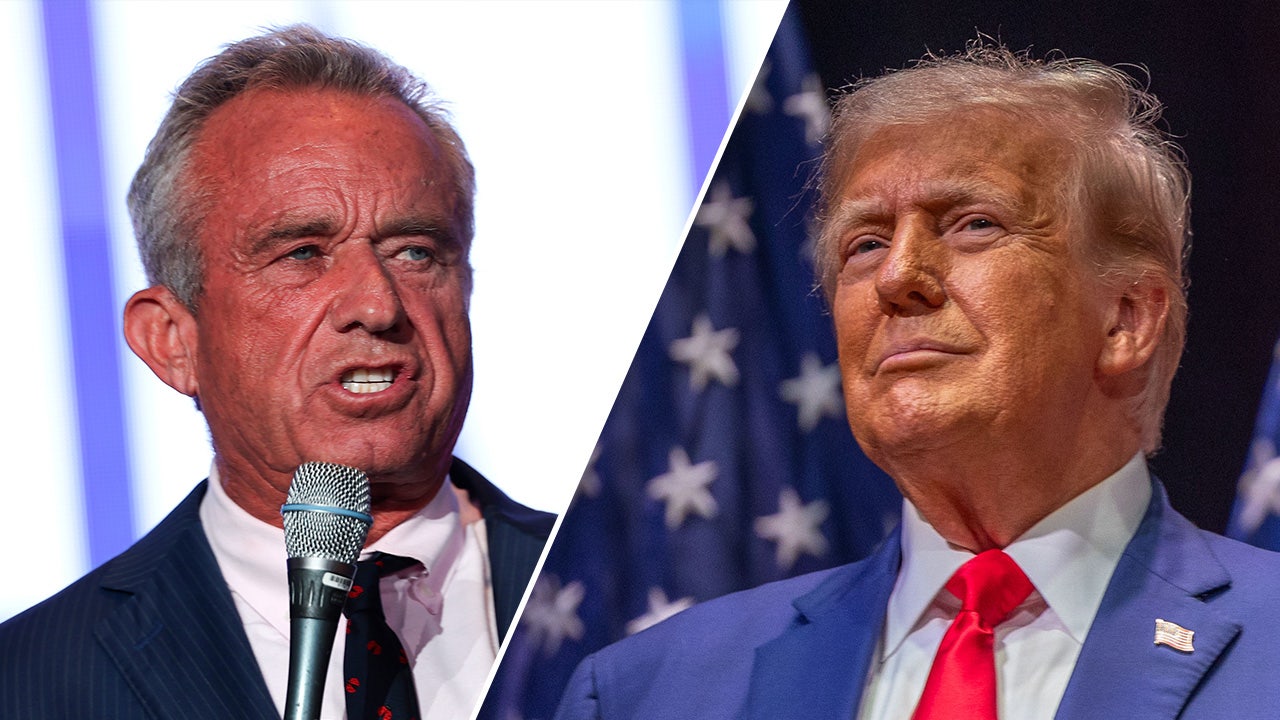
 Politics1 week ago
Politics1 week agoTrump taunted over speculated RFK Jr endorsement: 'Weird as hell'
-

 Politics1 week ago
Politics1 week agoVivek Ramaswamy sounds off on potential RFK Jr. role in a Trump administration
-

 World6 days ago
World6 days agoPortugal coast hit by 5.3 magnitude earthquake















